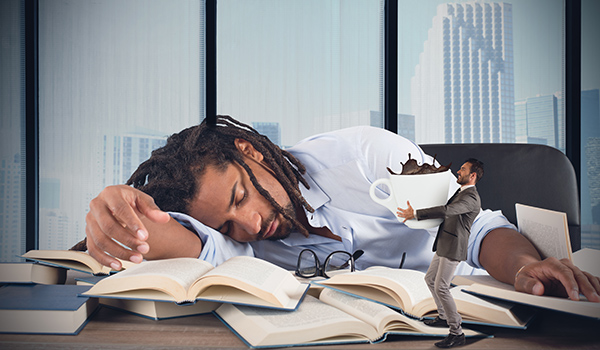
Many adults rely on caffeinated beverages to feel energized and improve focus throughout the workday but a reliance on caffeine can be detrimental to your quality of sleep. Considering that at least 80 percent of American adults consume caffeine on a daily basis and one in three report not getting enough sleep, understanding how caffeine affects sleep could be helpful for many people. But before we discuss the connection between caffeine and sleep, let’s cover some of the basics about caffeine.
What Is Caffeine?
Caffeine is a natural, plant-based substance that is found in coffee beans, cocoa beans and tea leaves. It acts as a stimulant, which increases energy. It also blocks adenosine, a chemical that makes you feel sleepy, increases dopamine, which makes you more alert, and limits the production of melatonin, which regulates your normal sleep-wake cycle.
How Does Caffeine Affect Your Body?
After consumption, caffeine enters the bloodstream via your stomach and begins to work its “magic” within 15 minutes. Although caffeine reaches its peak effectiveness within 30 to 60 minutes, it lingers in your body for hours. In fact, it can take up to six hours for just half of the caffeine to be processed and eliminated from your body. Studies have found that drinking caffeine within the six hours before bed can cut your total sleep time by an entire hour.
How Caffeine Affects Sleep
Consuming caffeine in the afternoon and evening has a negative affect on sleep quality. Of course, the closer to bedtime that you drink caffeine, the more caffeine affects sleep (your ability to both fall asleep and sleep well). A study in the Journal of Clinical Sleep Medicine found that caffeine taken directly at bedtime as well as three and six hours before can all negatively impact your quality of sleep. Of the various sleep stages, caffeine wrecks the most havoc on deep sleep, which is typically the most rejuvenating stage. During this deep sleep period, hormones are released that help repair muscles and tissues, control appetite and store up energy for the next day. You can track the amount of sleep you are getting by using a wearable device that add sleep measurements (e.g heart rate, breathing rate, restlessness, time) in your wellness portal.
How Much Caffeine Is Too Much?
Caffeine is measured in milligrams and, when consumed in moderate amounts at the right time of day, it poses no risk to your health. The FDA recommends no more than 32 ounces of coffee, equal to 400 milligrams, per day. For comparison using an 8-ounce cup, coffee has about 100 milligrams, black tea about 50 milligrams and green tea around 30 milligrams.
When To Stop Drinking Caffeine Before Bed?
You should stop drinking caffeine six to eight hours before bed to ensure that its lingering effects don’t interfere with your sleep and you can fall asleep faster. If you aim for a 10 o’clock bedtime, this means you should switch to decaf between 2 and 4 o’clock. The earlier you cut off caffeine, the better your odds of getting a good night’s rest.
Tips for Regulating Caffeine and Getting a Good Night’s Sleep
- Lower Caffeine Intake Throughout the Day – To make the transition easier, you can start to reduce your caffeine intake throughout the day. Start with your strongest caffeinated beverage, like a coffee, in the morning to give yourself a wake-up jolt. Switch to black or green tea in the early afternoon for a lighter boost and then end the day with a cup of decaf coffee or herbal tea before bed, if you feel like a hot beverage will help lull you to sleep.
- Keep An Eye On Drink Sizes – Remember all drinks are not created equal. An eight-ounce cup of coffee is a standard serving size but keep in mind that most coffee shops serve more than eight ounces. While the eight-ounce serving may only have 100 milligrams, bigger sizes contain higher amounts of caffeine and you may consume the recommended maximum of 400 milligrams in one drink if you’re not careful.
- Cut Back Overall Caffeine Intake In Steps – There’s no need to go cold turkey on your caffeine consumption. In fact, doing so can cause more harm than good. Gradually lower the amount of caffeine you drink each day to avoid the dreaded fatigue and headaches that often come with suddenly stopping.
By understanding the connection of how caffeine affects sleep, you can better take control of your life and learn to balance the two to create a harmonious combination.

